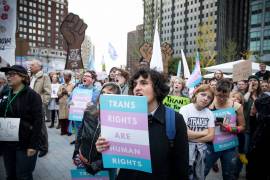
Indiana’s Religious Refusal Law Hurts More Than Just LGBT Hoosiers
Blog Search
On Tuesday, April 14, Gov. Mike Pence told reporters that “the difficult time that Indiana just passed through two weeks ago is behind us” and the State is “through the storm.”
Pence’s statements came just one day after his administration hired a global public relations firm to help repair the State’s reputation in the wake of the battle surrounding Indiana’s so-called “religious freedom” law. The State plans to pay the firm at least $2 million to try to rebrand Indiana and win back the support of businesses.
Gov. Pence, the storm is far from over. Indiana law is not fixed. Not even close.
And, in all the talk about how Indiana’s religious refusal law invites discrimination against lesbian and gay people, who remain without basic, state-law civil rights protections, something else important has gotten lost. This law hurts more than just lesbian and gay people. There’s no fixing it without ensuring that it cannot be used to justify harm to anyone. Women, people living with HIV, and transgender people in particular all remain deeply vulnerable despite the so-called “fix” hastily added to the law because that “fix” only limits use of the law for discrimination.
For example, when women seek health care from a pharmacist or a doctor, Indiana’s religious refusal law still invites medical providers to point to their own religious beliefs in denying care.
This isn’t simply a hypothetical scenario. In Benitez v. North Coast Women’s Care Medical Group, California doctors refused infertility treatment to our lesbian client, citing their religious beliefs. Just last week, a Georgia pharmacist acknowledged denying medication to a woman who was miscarrying, also relying on religion.
That pharmacist’s refusal is far from unique. In Illinois, pharmacists and corporate owners of pharmacies successfully sued under a religious refusal law written more narrowly than Indiana’s so that they could refuse to fill birth control prescriptions.
And the U.S. Supreme Court applied the federal “religious refusal” law—also narrower than Indiana’s new law—to allow Hobby Lobby to exclude birth control from the company health plan based on the owners’ personal religious objections. That decision tossed further fuel on efforts nationwide to expand religious rights to defy laws that protect others.
These common religious objections to FDA-approved medications ignore both women’s right to make their own reproductive health decisions and the fact that these medicines serve diverse health purposes, including cancer prevention and management of debilitating pain.
But although this medical care is only needed by women and not men, refusal to provide it may not be considered discrimination if all patients are refused. That means the nondiscrimination “fix” is no fix at all for this type of problem.
In Indiana, we also now have increased worries about religious refusals of care to people with HIV who frequently have particular health needs. Health care providers have in the past pointed to religious reasons for denying people living with HIV access to life-saving treatment.
In Rose v. Cahee, a religiously affiliated hospital successfully argued it had no liability for refusing to treat our HIV-positive client due to an exemption that the religious lobby inserted in the Americans with Disabilities Act.
In fact, numerous published cases confirm the widespread, mistaken view that religious objections to same-sex relationships justify harassment of coworkers and patients perceived to be gay or HIV-positive.
Indiana’s new law also may create additional obstacles for transgender people seeking medically necessary health care. Transgender people already face pervasive discrimination in health care settings.
In fact, Lambda Legal’s survey When Health Care Isn’t Caring found that transgender respondents reported the highest rates of discrimination and barriers to health care among the LGBT community, with more than half reporting such concerns. Increasing religious refusal rights without explicit gender identity protections threatens further rejection and stigmatization of this exceedingly vulnerable population.
Looking beyond these too-familiar concerns, the new law also facilitates objections by businesses to child welfare and labor protections, and to environmental, health and safety laws.
These also aren’t merely hypothetical concerns. As one recent example, a farmer in Utah successfully used a religious refusal law to defy an order requiring him to testify about alleged child labor violations. If federal authorities can be hindered as they seek to protect children, imagine the potential threats to food safety, to our environment—to any and all public welfare protections.
These are just a few of the ways in which Indiana’s religious refusal law continues to threaten significant harm to people notwithstanding the so-called “fix.” We have made great strides, Indiana, but we have very important work yet to do.




